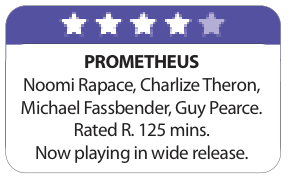Ridley Scott’s ‘Prometheus’ gets back to basics with this horrific thrill-ride

‘PROMETHEUS’ UNBOUND | The much-anticipated ‘Alien’ prequel is darkly gorgeous, as is heartthrob scientist Logan Marshall-Green, left, and quirky android Michael Fassbender.
ARNOLD WAYNE JONES | Life+Style Editor
The brilliance of director Ridley Scott’s original Alien was its simplicity: A haunted house movie set in space. It was a perfect, claustrophobic thriller, with a cast of seven (plus Jones the cat and, of course, the alien), all but one of whom get picked off. “In space, no one can hear you scream” read the tagline — has there ever been a more evocative and appropriate campaign?
The sequels were never quite as good, though Aliens was close: It was a war movie set in space. By the time they became their own genres — 3, Resurrection, Vs. Predator, etc. — the magic was gone.
 Scott’s back in the director’s chair for Prometheus, a prequel (yes, it absolutely is) to the Alien series that is the closest anyone has come to capturing the intensity and beauty of being scared shitless as a form of entertainment.
Scott’s back in the director’s chair for Prometheus, a prequel (yes, it absolutely is) to the Alien series that is the closest anyone has come to capturing the intensity and beauty of being scared shitless as a form of entertainment.
It’s set less than a century in the future, when archaeologists (and hot lovers) Elizabeth Shaw (Noomi Rapace, one of the strangest-looking actresses working today) and Charlie Holloway (Logan Marshall-Green, who’s dreamy in a hipster kinda way) have convinced a decrepit zillionaire (Guy Pearce, in fantastic makeup) that mankind’s creators may live on a remote, Earth-like planet. Their expedition — 17 strong, not quite as elegant as seven, but good still — take the ship Prometheus there and encounter … well, not exactly the alien we have grown to know and love, but something. And it’s terrifying.
At least it gets there. Very little happens for about the first hour of Prometheus, though it would be incorrect to call that a bore, or even a tease. Instead, he’s modulated it with a rhythm that’s increasingly gut-wrenching, like Ravel’s Bolero: By the time what first happens happens, your heart nearly explodes … and not like John Hurt’s did in the original. It’s deferred gratification at its most satisfying.
The problem with sequels is that audiences already know what to expect, so you have to deliver that — and more — sooner and more frequently. Scott rebuffs that wisdom. He’s approached the material largely afresh, imagining characters unencumbered by foreknowledge about what a clusterfuck they are stepping into. (It’s probably why the ad campaign has downplayed the Alien roots — it wants you to forget what you already know. Oops.)
But it’s hard to ignore recurring themes that have made Alien (and even some of the sequels) something extraordinary: The moral implications of corporations’ grabs for power, the self-destructive nature of man, the true meaning of extinction. And the inscrutable android (Michael Fassbender) is there to unnerve us via his hidden agenda (here, he has an odd obsession with Lawrence of Arabia and even looks like a less pretty Peter O’Toole).
The performances are all good within the context of the horror format; Charlize Theron as the icy corporate drone shows some melt in a flirtatious scene with Idris Elba, and Fassbender’s quirky robot serves Scott’s patented clinical coolness, interrupted by moments of voracious gore.
Prometheus has a stronger quasi-religious subtext than others in the series; it’s set during Christmas, and touches on what a god really is. (Prometheus was a god; he gave the power of fire to mankind, and was punished for eternity for doing so.) I expect sci-fi nerds will debate the opening scene (and the ending) in countless chatrooms for months. That’s good filmmaking.
This article appeared in the Dallas Voice print edition June 8, 2012.

Great review. Spot on